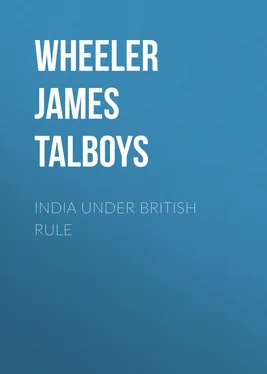Fox's India Bill, 1783.
In 1783, when the coalition ministry of Charles James Fox and Lord North was in power, Fox brought forward a bill for abolishing the Court of Directors, and transferring their authority and patronage to seven Commissioners nominated by Ministers. The bill was passed by the Commons, but George III. opposed it, and it was rejected by the Lords.
Pitt creates a board of control, 1784.
In 1784 William Pitt the younger brought in another bill, which left the Directors in full possession of their power and patronage, but brought them under the strict supervision of a Board of Control, consisting of six privy councillors nominated by the Crown. Henceforth the President of the Board of Control, who was always a member of the Cabinet, was the centre of all authority, and was strictly responsible to Parliament for the conduct of Indian affairs.
Trial of Warren Hastings.
§14. Warren Hastings returned to England in 1785 to find that the minds of Burke, Fox, and other leading statesmen had been poisoned against him by Philip Francis. Eventually he was impeached by the Commons and tried by the Lords in Westminster Hall. Hastings was certainly responsible for the Rohilla war, and also responsible for the execution of Nundcomar; but the crowning charge against him was that he had connived at the torture of the servants of the Oudh Begums by the Nawab Vizier of Oudh. The charge was painted in terrible colours by Sheridan, and it may be as well to sum up the actual facts.
Case of the Oudh Begums.
A Nawab Vizier of Oudh died in 1775, leaving treasure to the value of some two or three millions sterling in the public treasury at Lucknow. The son and successor of the deceased ruler naturally assumed possession on the ground that the money was state property; but his mother and grandmother, known as the two Begums, claimed it as private property, which the late Nawab Vizier had made over to them as a gift. Warren Hastings declined to interfere. Philip Francis, however, insisted that the British Government ought to interfere; and eventually the money was made over to the Begums on the condition that they paid some quarter of a million towards the State debt due to the East India Company.
Did Hastings connive at torture?
During the Mahratta war money was urgently required. The Nawab Vizier owed large arrears to the Company, but could not pay up unless he recovered possession of the State treasures. Philip Francis had returned to England. Accordingly Warren Hastings abandoned the Begums to the tender mercies of the Nawab Vizier, and connived at the imprisonment of their servants. It subsequently appeared that the Nawab Vizier tortured the servants until the money was surrendered, but there is no evidence to show that Warren Hastings connived at the torture.
Services of Hastings.
Warren Hastings was undoubtedly a man of great abilities and marvellous energy. His services to the East India Company, and to British interests in India, are beyond all calculation. But he was exposed to great temptation in times when public virtue was less exalted than it has been in the present generation, and he was hedged around with enemies who were spiteful and unscrupulous enough to misrepresent any and every transaction. His errors were those of his time, but his genius is stamped for ever on the history of British India. His misdeeds cannot be entirely overlooked, but he paid a bitter penalty. For many months he was threatened by the proceedings which culminated in his trial at Westminster Hall. Eventually he was acquitted of all charges, but his trial was protracted over seven long years and ruined his private fortunes and public career.
Merits as an administrator.
After the lapse of a hundred years, the flaws in the character of Warren Hastings may be condoned in consideration of his merits as an administrator. He found the Bengal provinces in chaos, and introduced light and order. He converted British traders into revenue collectors, magistrates, and judges, but he established Courts of Appeal to supervise their proceedings; and if his magistrates and judges had no legal training, they were at any rate Britons with a national sense of justice, and their decisions were infinitely better than those of Bengal zemindars, without law, or justice, or control. Warren Hastings kept a watchful eye on British interests as well as on the welfare of the people under his charge. He sent a mission to Tibet, which shows his anxiety for the extension of trade. He recorded a touching tribute to the memory of Augustus Cleveland, a young Bengal civilian who had done much to humanise and elevate the rude Sonthals of the Rajmahal hills, which sufficiently proves his sympathy with the well-being of the masses. Altogether, if Warren Hastings is not so free from blame as he is represented by his friends, he certainly was not so black as he has been painted by his enemies.
Lord Cornwallis, 1786-93.
§15. In 1786 Lord Cornwallis, an independent peer, was appointed Governor-General. This event marks a change in British rule. Lord Cornwallis was the first British peer, and the first Englishman not in the service of the East India Company, who was appointed to the post of Governor-General. He carried out two measures which have left their mark in history, namely, the perpetual settlement with the Bengal zemindars, and the reform of the judicial system.
Perpetual settlement.
The settlement with the Bengal zemindars was still awaiting a decision. Lord Cornwallis was anxious to arrange the land revenue of the Bengal provinces on English lines. He abandoned the yearly leases, and concluded leases for ten years, with the view of eventually declaring the settlement to be perpetual. Mr. John Shore, a Bengal civilian, pressed for a preliminary inquiry into the rights of the ryots, for the purpose of fixing the rents. But Lord Cornwallis was opposed to any further delay. In 1793 he proclaimed that the ten years settlement would be perpetual; that the tenant-rights of ryots would be left to future inquiry; and that henceforth the Bengal zemindars would be invested with the proprietary rights enjoyed by English landlords, so long as they paid the fixed yearly revenue to Government and respected all existing rights of ryots and cultivators.
Judicial reforms.
The judicial system introduced by Warren Hastings was modified by Lord Cornwallis. The British collector, as already seen, was also magistrate and civil judge. Lord Cornwallis decided that a collector ought to have no judicial duties under which he might be called on to adjudicate in revenue questions. Accordingly a regulation was passed under which the duties of revenue collector were separated from those of magistrate and judge, and the magistrate and judge was to be the head of the district, whilst the revenue collector was his subordinate. It is difficult to understand the merits of this measure. Since then the two offices have been sometimes united and sometimes separated. Eventually the two offices of magistrate and collector were united in the same person.
Конец ознакомительного фрагмента.
Текст предоставлен ООО «ЛитРес».
Прочитайте эту книгу целиком, купив полную легальную версию на ЛитРес.
Безопасно оплатить книгу можно банковской картой Visa, MasterCard, Maestro, со счета мобильного телефона, с платежного терминала, в салоне МТС или Связной, через PayPal, WebMoney, Яндекс.Деньги, QIWI Кошелек, бонусными картами или другим удобным Вам способом.
Читать дальше












